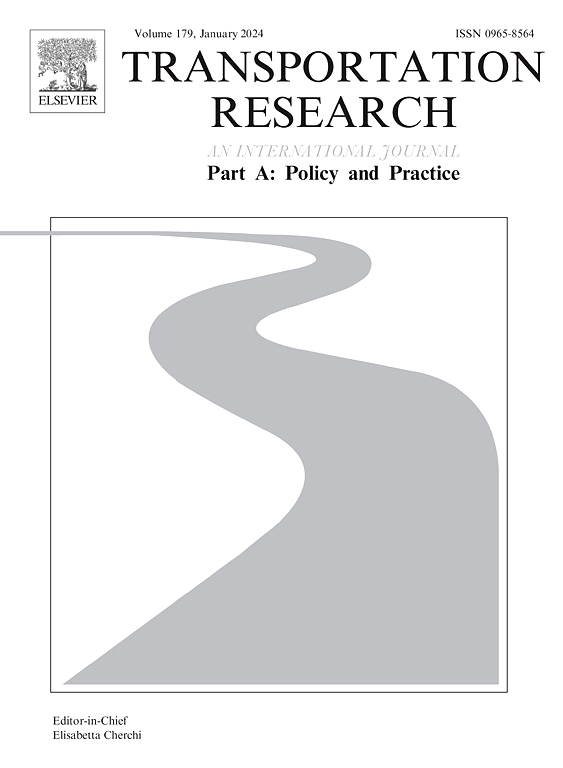利用移动地理定位数据揭示票价削减对公共交通的社会和空间影响
IF 6.8
1区 工程技术
Q1 ECONOMICS
Transportation Research Part A-Policy and Practice
Pub Date : 2025-08-28
DOI:10.1016/j.tra.2025.104647
引用次数: 0
摘要
补贴公共交通票价是促进可持续交通和减少对汽车依赖的常用政策工具。然而,很少有研究能够调查高额票价补贴对旅行行为模式的因果影响。这项研究调查了德国全国范围内的票价减免政策的影响:德国票券(DT),从2023年5月到2024年12月,该政策将区域和本地交通的价格定为每月49欧元。利用来自1110多万台移动设备的大规模移动地理定位数据,涵盖2022年和2023年3月、4月和5月的117亿个地理定位记录,我们采用时移差分模型来评估德国各地游客数量和旅行距离的变化。结果表明,D-Ticket在第一个月增加了访问量(+26.2%),增加了旅行距离(+11.8%)。此外,我们还发现,这种影响在空间和社会经济方面存在差异:城市中心(如高活动中心)的访问量和旅行距离的增长幅度最大。外国人口(无德国国籍的居民)较多的地区和来自低租金地区的人受益最大,旅行和距离的增加幅度更大。这些结果通过提供大规模、高分辨率和以前未观察到的证据,有助于理解交通政策干预措施如何影响德国的流动性。我们的研究为公共交通定价的广泛影响提供了有价值的见解,为公平有效的票价补贴政策提供了信息。本文章由计算机程序翻译,如有差异,请以英文原文为准。
Uncovering the social and spatial effects of fare cuts on public transport with mobile geolocation data
Subsidizing public transit fares is a common policy tool for promoting sustainable mobility and reducing car dependency. Nonetheless, few studies have been able to investigate the causal impact of large fare subsidies on travel behavior patterns. This study investigates the impacts of a nationwide fare reduction policy in Germany: the Deutschlandticket (DT), which priced regional and local transit at 49 euros per month, effective from May 2023 through December 2024. Using large-scale mobile geolocation data from over 11.1 million mobile phone devices, covering 11.7 billion geolocation records in March, April, and May for 2022 and 2023, we employed a time-shifted difference-in-difference model to assess changes in visitor volumes and distance of trips to various locations across Germany. Our results indicate that the D-Ticket increased visit numbers (+26.2%) and increased travel distances (+11.8%) in the first month. Moreover, we found that the impact varied spatially and socioeconomically: urban centers such as high-activity hubs experienced the highest increase in visits and travel distance. Areas visited by a higher share of the foreign population (residents w/o German citizenship) and people from low-rent areas benefited the most, seeing more substantial increases in trips and distances. These results contribute to understanding the effectiveness of transit policy interventions by offering large-scale, high-resolution, and previously unobserved evidence of how they influenced mobility in Germany. Our study provides valuable insights into the broader impacts of public transit pricing, informing equitable and effective fare subsidy policies.
求助全文
通过发布文献求助,成功后即可免费获取论文全文。
去求助
来源期刊
CiteScore
13.20
自引率
7.80%
发文量
257
审稿时长
9.8 months
期刊介绍:
Transportation Research: Part A contains papers of general interest in all passenger and freight transportation modes: policy analysis, formulation and evaluation; planning; interaction with the political, socioeconomic and physical environment; design, management and evaluation of transportation systems. Topics are approached from any discipline or perspective: economics, engineering, sociology, psychology, etc. Case studies, survey and expository papers are included, as are articles which contribute to unification of the field, or to an understanding of the comparative aspects of different systems. Papers which assess the scope for technological innovation within a social or political framework are also published. The journal is international, and places equal emphasis on the problems of industrialized and non-industrialized regions.
Part A''s aims and scope are complementary to Transportation Research Part B: Methodological, Part C: Emerging Technologies and Part D: Transport and Environment. Part E: Logistics and Transportation Review. Part F: Traffic Psychology and Behaviour. The complete set forms the most cohesive and comprehensive reference of current research in transportation science.

 求助内容:
求助内容: 应助结果提醒方式:
应助结果提醒方式:


